- Home
- William Shakespeare
All's Well That Ends Well Page 4
All's Well That Ends Well Read online
Page 4
Young Bertram.
To Bertram
KING Youth, thou bear'st thy father's face.
Frank nature, rather curious than in haste26,
Hath well composed thee. Thy father's moral parts27
Mayst thou inherit too! Welcome to Paris.
BERTRAM My thanks and duty are your majesty's.
KING I would I had that corporal soundness30 now,
As when thy father and myself in friendship
First tried our soldiership. He did look far32
Into the service of the time and was33
Discipled of the bravest.34 He lasted long,
But on us both did haggish35 age steal on
And wore us out of act. It much repairs36 me
To talk of your good father; in his youth
He had the wit which I can well observe
Today in our young lords. But they may jest
Till their own scorn return to them unnoted40
Ere they can hide their levity in honour.41
So like a courtier, contempt42 nor bitterness
Were in his pride or sharpness; if they were,
His equal had awaked44 them, and his honour,
Clock to itself, knew the true45 minute when
Exception46 bid him speak, and at this time
His tongue obeyed his hand. Who47 were below him
He used as creatures of another place48
And bowed his eminent top49 to their low ranks,
Making them proud of his humility,
In their poor praise he humbled.51 Such a man
Might be a copy52 to these younger times;
Which, followed well, would demonstrate them now53
But goers backward.
BERTRAM His good remembrance, sir,
Lies richer in your thoughts than on his tomb,
So in approof57 lives not his epitaph
As in your royal speech.
KING Would I were with him! He would always say --
Methinks I hear him now. His plausive60 words
He scattered not in ears, but grafted61 them,
To grow there and to bear62 -- 'Let me not live' --
This his good melancholy oft began
On the catastrophe and heel of pastime64,
When it was out65 -- 'Let me not live,' quoth he,
'After my flame lacks oil, to be the snuff66
Of younger spirits, whose apprehensive67 senses
All but new things disdain; whose judgements are
Mere fathers of their garments, whose constancies69
Expire before their fashions.' This he wished.
I, after him, do after him wish too71,
Since I nor72 wax nor honey can bring home,
I quickly were dissolved73 from my hive
To give some labourers74 room.
SECOND LORD You're loved, sir.
They that least lend it you shall lack76 you first.
KING I fill a place, I know't. How long is't, count,
Since the physician at your father's died?
He was much famed.
BERTRAM Some six months since, my lord.
KING If he were living, I would try him yet.
Lend me an arm: the rest82 have worn me out
With several applications.83 Nature and sickness
Debate it84 at their leisure. Welcome, count.
My son's no dearer.
BERTRAM Thank your majesty.
Exeunt. Flourish
[Act 1 Scene 3]
running scene 3
Enter Countess, Steward [Reynaldo] and Clown [Lavatch]
COUNTESS I will now hear; what say you of this gentlewoman?1
REYNALDO Madam, the care I have had to even your content2, I
wish might be found in the calendar3 of my past endeavours,
for then we wound our modesty, and make foul the clearness4
of our deservings5, when of ourselves we publish them.
COUNTESS What does this knave here? Get you gone, sirrah.6
The complaints I have heard of you I do not all believe. 'Tis
my slowness that I do not, for I know you lack not folly to
commit them, and have ability enough to make such
knaveries yours.
LAVATCH 'Tis not unknown to you, madam, I am a poor11 fellow.
COUNTESS Well12, sir.
LAVATCH No, madam, 'tis not so well that I am poor, though
many of the rich are damned. But if I may have your
ladyship's good will to go to the world, Isbel the woman15 and
I will do16 as we may.
COUNTESS Wilt thou needs17 be a beggar?
LAVATCH I do beg your good will in this case.
COUNTESS In what case?
LAVATCH In Isbel's case and mine own. Service is no heritage20:
and I think I shall never have the blessing of God till I have
issue o'my body, for they say bairns22 are blessings.
COUNTESS Tell me thy reason why thou wilt marry.
LAVATCH My poor body, madam, requires it. I am driven on by
the flesh, and he must needs go25 that the devil drives.
COUNTESS Is this all your worship's26 reason?
LAVATCH Faith, madam, I have other holy27 reasons, such as
they are.
COUNTESS May the world29 know them?
LAVATCH I have been, madam, a wicked creature, as you and
all flesh and blood are, and indeed I do marry that I may
repent.32
COUNTESS Thy marriage, sooner than thy wickedness.
LAVATCH I am out o' friends, madam, and I hope to have
friends for my wife's sake.35
COUNTESS Such friends are thine enemies, knave.
LAVATCH You're shallow, madam, in37 great friends, for the
knaves come to do38 that for me which I am aweary of. He that
ears my land spares my team and gives me leave to in39 the
crop. If I be his cuckold, he's my drudge; he that comforts40 my
wife is the cherisher41 of my flesh and blood; he that cherishes
my flesh and blood loves my flesh and blood; he that loves my
flesh and blood is my friend: ergo43, he that kisses my wife is my
friend. If men could be contented to be what they are44, there
were no fear in marriage, for young Charbon the Puritan45
and old Poysam the Papist, howsome'er46 their hearts are
severed in religion, their heads are both one. They may jowl47
horns together, like any deer i'th'herd.
COUNTESS Wilt thou ever be a foul-mouthed and calumnious49
knave?
LAVATCH A prophet I, madam, and I speak the truth the
next52 way.
Sings
For I the ballad will repeat,
Which men full true shall find:
Your marriage comes by destiny,
Your cuckoo sings by kind.56
COUNTESS Get you gone, sir. I'll talk with you more anon.57
REYNALDO May it please you, madam, that he bid Helen come
to you: of her I am to speak.
To Lavatch
COUNTESS Sirrah, tell my gentlewoman I would
speak with her -- Helen, I mean.
Sings
LAVATCH 'Was this fair face the cause,' quoth she62,
'Why the Grecians sacked Troy?63
Fond64 done, done fond,
Was this King Priam's65 joy?'
With that she sighed as she stood,
With that she sighed as she stood,
And gave this sentence68 then:
'Among69 nine bad if one be good,
Among nine bad if one be good,
There's yet one good in ten.'
COUNTESS What, one good in ten? You corrupt the song72,
sirrah.
LAVATCH One good woman in ten, madam; which is a
purifying o'th'song. Would God
would serve the world75 so all
the year! We'd find no fault with the tithe-woman76, if I were
the parson. One in ten, quoth a? An77 we might have a good
woman born but ere every blazing star78, or at an earthquake,
'twould mend the lottery well. A man may draw79 his heart
out ere a pluck one.80
COUNTESS You'll be gone, sir knave, and do as I command you?
LAVATCH That82 man should be at woman's command, and yet
no hurt done! Though honesty83 be no puritan, yet it will do
no hurt. It will wear the surplice of humility over the black84
gown of a big heart. I am going, forsooth.85 The business is for
Helen to come hither.
Exit
COUNTESS Well, now.
REYNALDO I know, madam, you love your gentlewoman entirely.
COUNTESS Faith, I do. Her father bequeathed89 her to me, and
she herself, without other advantage, may lawfully make90
title to as much love as she finds. There is more owing her
than is paid and more shall be paid her than she'll demand.
REYNALDO Madam, I was very late93 more near her than I think
she wished me. Alone she was, and did communicate to
herself her own words to her own ears. She thought, I dare
vow for her, they touched not any stranger sense. Her matter96
was, she loved your son. Fortune, she said, was no goddess,
that had put such difference betwixt their two estates.98 Love
no god, that would not extend his might only where qualities99
were level. Dian no queen of virgins, that would suffer100 her
poor knight surprised101 without rescue in the first assault or
ransom afterward. This she delivered in the most bitter touch102
of sorrow that e'er I heard virgin exclaim in, which I held my
duty speedily to acquaint you withal, sithence, in the loss104
that may happen, it concerns you something105 to know it.
COUNTESS You have discharged106 this honestly. Keep it to
yourself. Many likelihoods107 informed me of this before, which
hung so tott'ring in the balance that I could neither believe
nor misdoubt. Pray you leave me. Stall109 this in your bosom,
and I thank you for your honest care. I will speak with you
further anon.
Exit Steward [Reynaldo]
Enter Helen
Aside
Even so it was with me when I was young.
If ever we are nature's, these113 are ours. This thorn
Doth to our rose of youth rightly belong.
Our blood115 to us, this to our blood is born:
It is the show and seal116 of nature's truth,
Where love's strong passion is impressed117 in youth.
By our remembrances of days foregone,
Such were our faults, or119 then we thought them none.
Her eye is sick on't. I observe120 her now.
HELEN What is your pleasure, madam?
COUNTESS You know, Helen, I am a mother to you.
HELEN Mine honourable mistress.
COUNTESS Nay, a mother. Why not a mother? When I said 'a mother',
Methought125 you saw a serpent. What's in 'mother'
That you start126 at it? I say I am your mother,
And put you in the catalogue of those
That were enwombed mine.128 'Tis often seen
Adoption strives with nature, and choice breeds129
A native slip to us from foreign seeds.
You ne'er oppressed me with a mother's groan131,
Yet I express to you a mother's care.
God's mercy, maiden! Does it curd133 thy blood
To say I am thy mother? What's the matter,
That this distempered135 messenger of wet,
The many-coloured Iris, rounds136 thine eye?
-- Why? That you are my daughter?
HELEN That I am not.138
COUNTESS I say I am your mother.
HELEN Pardon, madam.
The Count Rossillion cannot be my brother:
I am from humble, he from honoured name,
No note upon my parents143, his all noble.
My master, my dear lord he is, and I
His servant live, and will his vassal145 die.
He must not be my brother.
COUNTESS Nor I your mother.
HELEN You are my mother, madam, would you were --
So149 that my lord your son were not my brother --
Indeed my mother! Or were you both our mothers150,
I care no more for than151 I do for heaven,
So I were not his sister. Can't no other152
But, I your daughter, he must be my brother?
COUNTESS Yes, Helen, you might be my daughter-in-law.
God shield155 you mean it not! Daughter and mother
So strive upon your pulse. What, pale again?
My fear hath catched your fondness.157 Now I see
The mystery of your loveliness158, and find
Your salt tears' head. Now to all sense 'tis gross159:
You love my son. Invention160 is ashamed
Against161 the proclamation of thy passion
To say thou dost not: therefore tell me true.
But tell me then 'tis so, for look, thy cheeks
Confess it, t'one to th'other, and thine eyes
See it so grossly shown in thy behaviours
That in their kind166 they speak it. Only sin
And hellish obstinacy tie thy tongue,
That truth should be suspected.168 Speak, is't so?
If it be so, you have wound a goodly clew.169
If it be not, forswear't: howe'er, I charge170 thee,
As heaven shall work in me for thine avail171,
To tell me truly.
HELEN Good madam, pardon me.
COUNTESS Do you love my son?
HELEN Your pardon, noble mistress.
COUNTESS Love you my son?
HELEN Do not you love him, madam?
COUNTESS Go not about; my love hath in't a bond178
Whereof the world takes note.179 Come, come, disclose
The state of your affection, for your passions
Have to the full appeached.181
HELEN Then I confess,
|Kneels|
Here on my knee, before high heaven and you,
That before184 you, and next unto high heaven,
I love your son.
My friends186 were poor but honest, so's my love.
Be not offended, for it hurts not him
That he is loved of me; I follow him not
By any token of presumptuous suit189,
Nor would I have him till I do deserve him,
Yet never know how that desert should be.
I know I love in vain, strive against hope.
Yet in this captious and intenible193 sieve
I still194 pour in the waters of my love
And lack not to lose still195; thus, Indian-like,
Religious196 in mine error, I adore
The sun that looks upon his worshipper
But knows of him no more.198 My dearest madam,
Let not your hate encounter with199 my love,
For loving where you do; but if yourself,
Whose aged honour cites201 a virtuous youth,
Did ever in so true a flame of liking
Wish chastely and love dearly, that your Dian
Was both herself204 and love -- O, then, give pity
To her whose state is such that cannot choose
But lend and give where she is sure to lose206;
That seeks not to find that her search implies207,
But riddle-like lives sweetly where she dies.208
COUNTESS Had you not lately an intent -- speak truly --
To go to Paris?
HELEN Madam, I had.
COUNTESS Wherefore?212 Tell true.
HELEN I will tell truth, by grace213 itself I swear.
You know my father left me some prescriptions214
Of rare and proved effects, such as his reading
And manifest216 experience had collected
For general sovereignty217, and that he willed me
In heedfull'st reservation to bestow them218,
As notes whose faculties inclusive219 were
More than they were in note.220 Amongst the rest,
There is a remedy, approved221, set down,
To cure the desp'rate222 languishings whereof
The king is rendered lost.223
COUNTESS This was your motive for Paris, was it? Speak.
HELEN My lord your son made me to think of this;
Else Paris and the medicine and the king
Had from the conversation227 of my thoughts
Haply228 been absent then.
COUNTESS But think you, Helen,
If you should tender230 your supposed aid,
He would receive it? He and his physicians
Are of a mind.232 He, that they cannot help him,
They, that they cannot help. How shall they credit233
A poor unlearned virgin, when the schools234,
Embowelled of their doctrine, have left off235
The danger to itself?
HELEN There's something in't
More than my father's skill, which was the great'st
Of his profession, that his good receipt239
Shall for my legacy be sanctified240
By th'luckiest stars in heaven, and would your honour
But give me leave to try success, I'd venture242
The well-lost243 life of mine on his grace's cure
By such a244 day and hour.
COUNTESS Dost thou believe't?
HELEN Ay, madam, knowingly.246
COUNTESS Why, Helen, thou shalt have my leave247 and love,
Means and attendants and my loving greetings
To those of mine in court. I'll stay at home
And pray God's blessing into250 thy attempt.
Be gone tomorrow. And be sure of this:
What I can help thee to thou shalt not miss.252
Exeunt
Act 2 [Scene 1]
running scene 4
Enter the King [carried in a chair] with divers young Lords taking leave for the Florentine war, Count Rossillion [Bertram] and Parolles. Flourish cornets
KING Farewell, young lords. These warlike principles1
Do not throw from you.2 And you, my lords, farewell.
Share the advice betwixt you. If both gain, all
The gift4 doth stretch itself as 'tis received,
And is enough for both.
FIRST LORD 'Tis our hope, sir,
After well-entered7 soldiers, to return
And find your grace in health.
KING No, no, it cannot be; and yet my heart
Will not confess he owes10 the malady
That doth my life besiege. Farewell, young lords.
Whether I live or die, be you the sons
Of worthy Frenchmen. Let higher Italy13 --
Those bated that inherit but the fall14
Of the last monarchy -- see that you come
Not to woo honour, but to wed16 it, when

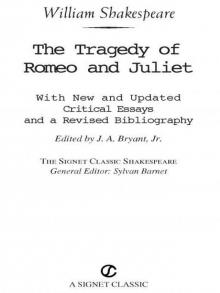 Romeo and Juliet
Romeo and Juliet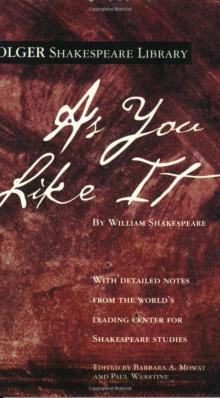 As You Like It (Folger Shakespeare Library)
As You Like It (Folger Shakespeare Library)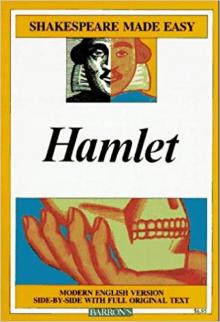 Hamlet
Hamlet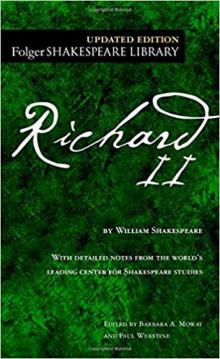 Richard II (Folger Shakespeare Library)
Richard II (Folger Shakespeare Library) Macbeth
Macbeth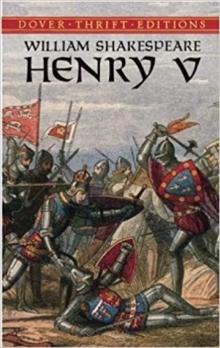 Henry V
Henry V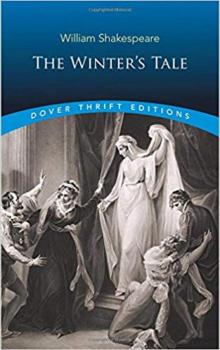 The Winter's Tale
The Winter's Tale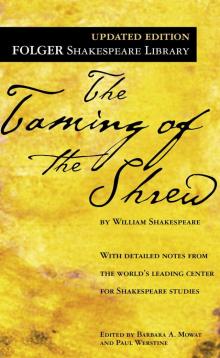 The Taming of the Shrew
The Taming of the Shrew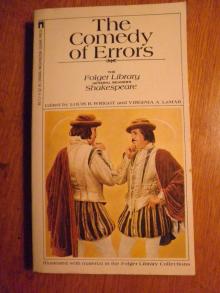 The Comedy of Errors
The Comedy of Errors King Lear (Folger Shakespeare Library)
King Lear (Folger Shakespeare Library)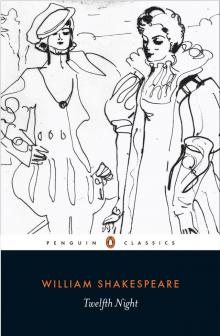 Twelfth Night
Twelfth Night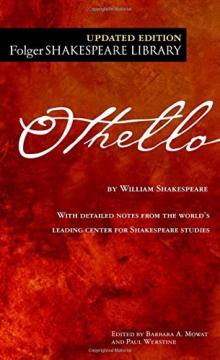 Othello
Othello The Two Gentlemen of Verona
The Two Gentlemen of Verona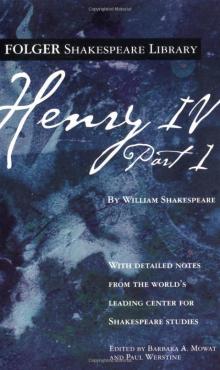 Henry IV, Part 1 (Folger Shakespeare Library)
Henry IV, Part 1 (Folger Shakespeare Library)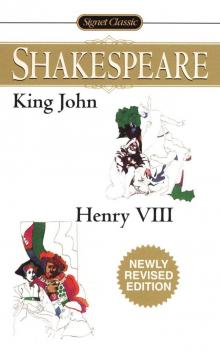 King John/Henry VIII (Signet Classics)
King John/Henry VIII (Signet Classics)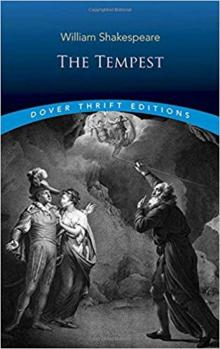 The Tempest
The Tempest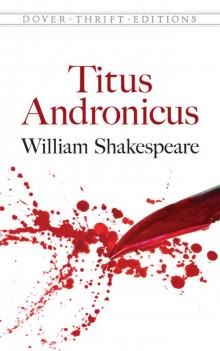 Titus Andronicus (Dover Publications)
Titus Andronicus (Dover Publications)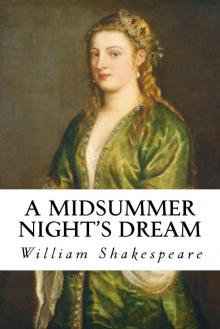 A Midsummer Night's Dream
A Midsummer Night's Dream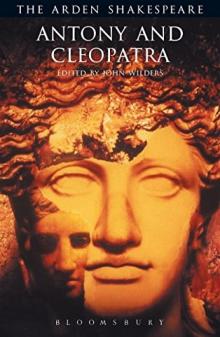 Antony and Cleopatra (Arden Shakespeare: Third Series)
Antony and Cleopatra (Arden Shakespeare: Third Series)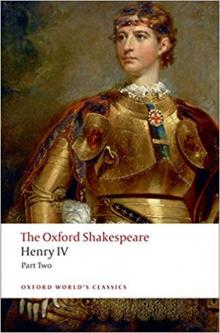 The Oxford Shakespeare: Henry IV, Part 2 (Oxford World's Classics)
The Oxford Shakespeare: Henry IV, Part 2 (Oxford World's Classics)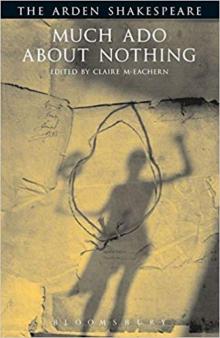 Much Ado About Nothing (Arden Shakespeare: Third Series)
Much Ado About Nothing (Arden Shakespeare: Third Series)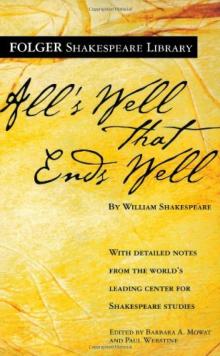 All's Well That Ends Well
All's Well That Ends Well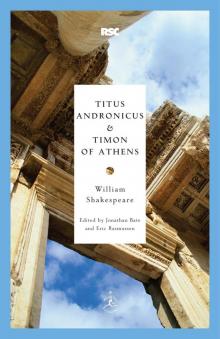 Titus Andronicus & Timon of Athens
Titus Andronicus & Timon of Athens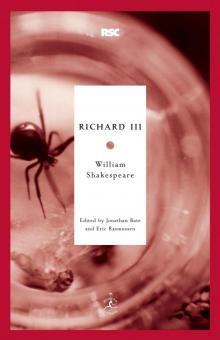 Richard III (Modern Library Classics)
Richard III (Modern Library Classics)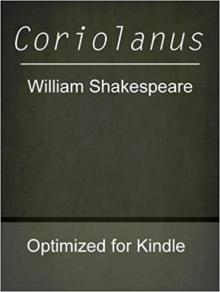 Coriolanus
Coriolanus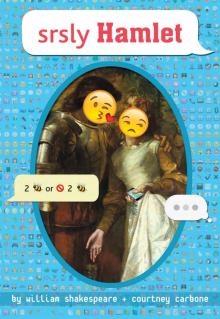 srsly Hamlet (OMG Shakespeare)
srsly Hamlet (OMG Shakespeare)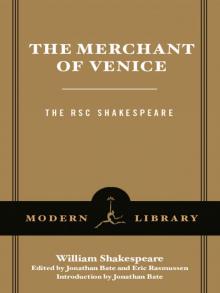 The Merchant of Venice
The Merchant of Venice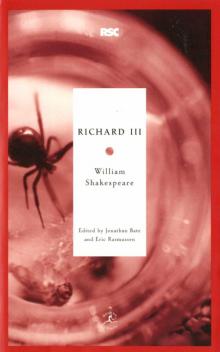 Richard III
Richard III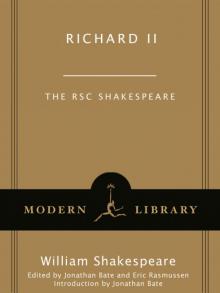 Richard II
Richard II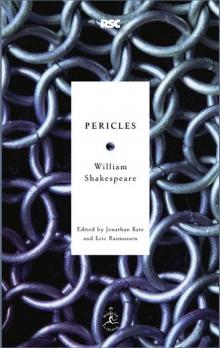 Pericles
Pericles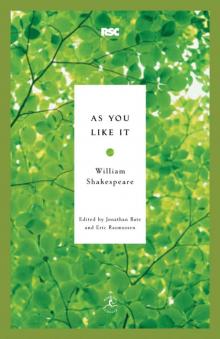 As You Like It
As You Like It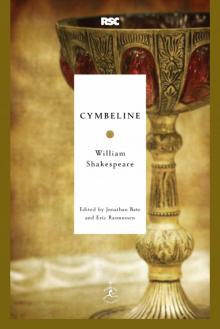 Cymbeline
Cymbeline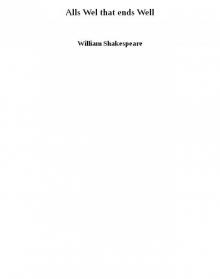 Alls Wel that ends Well
Alls Wel that ends Well YOLO Juliet
YOLO Juliet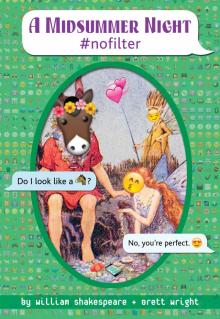 A Midsummer Night #nofilter
A Midsummer Night #nofilter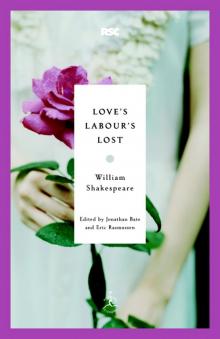 Love's Labour's Lost
Love's Labour's Lost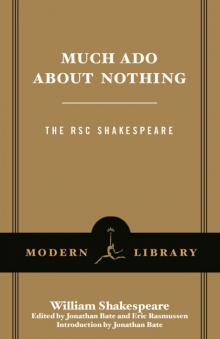 Much Ado About Nothing
Much Ado About Nothing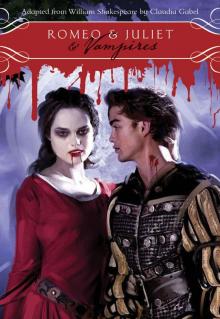 Romeo & Juliet & Vampires
Romeo & Juliet & Vampires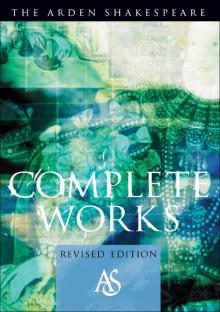 The Arden Shakespeare Complete Works
The Arden Shakespeare Complete Works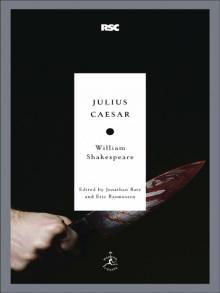 Julius Caesar
Julius Caesar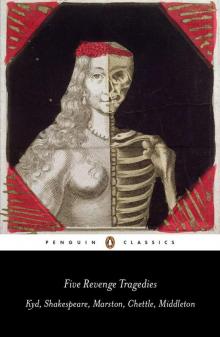 Five Revenge Tragedies: The Spanish Tragedy, Hamlet, Antonio's Revenge, The Tragedy of Hoffman, The Revenger's Tragedy (Penguin Classics)
Five Revenge Tragedies: The Spanish Tragedy, Hamlet, Antonio's Revenge, The Tragedy of Hoffman, The Revenger's Tragedy (Penguin Classics)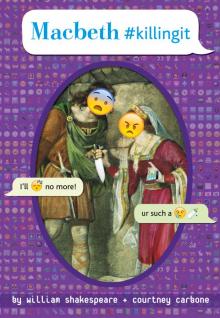 Macbeth #killingit
Macbeth #killingit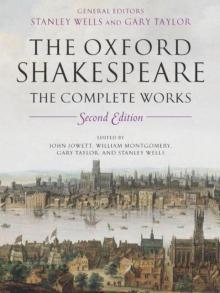 The Oxford Shakespeare: The Complete Works
The Oxford Shakespeare: The Complete Works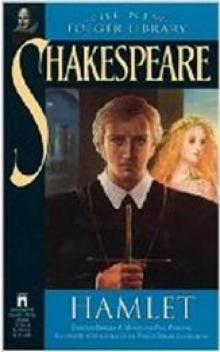 Hamlet, Prince of Denmark (Collins edition)
Hamlet, Prince of Denmark (Collins edition)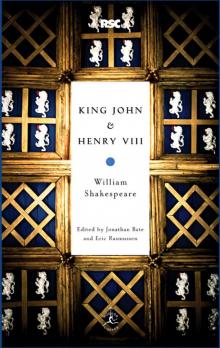 King John & Henry VIII
King John & Henry VIII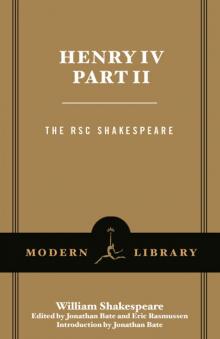 Henry IV, Part 2
Henry IV, Part 2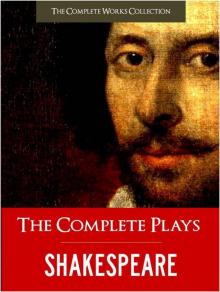 Complete Plays, The
Complete Plays, The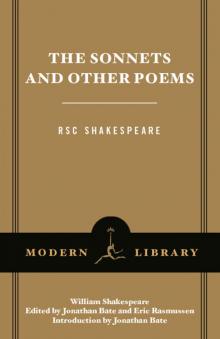 The Sonnets and Other Poems
The Sonnets and Other Poems Antony and Cleopatra
Antony and Cleopatra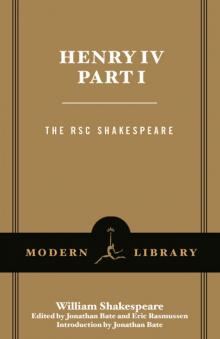 Henry IV, Part 1
Henry IV, Part 1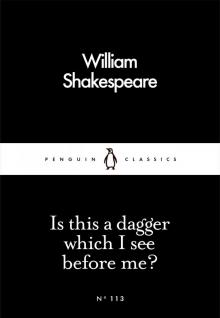 Is This a Dagger Which I See Before Me?
Is This a Dagger Which I See Before Me?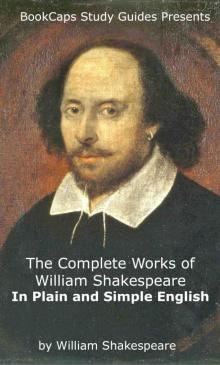 The Complete Works of William Shakespeare In Plain and Simple English (Translated)
The Complete Works of William Shakespeare In Plain and Simple English (Translated) The Sonnets
The Sonnets